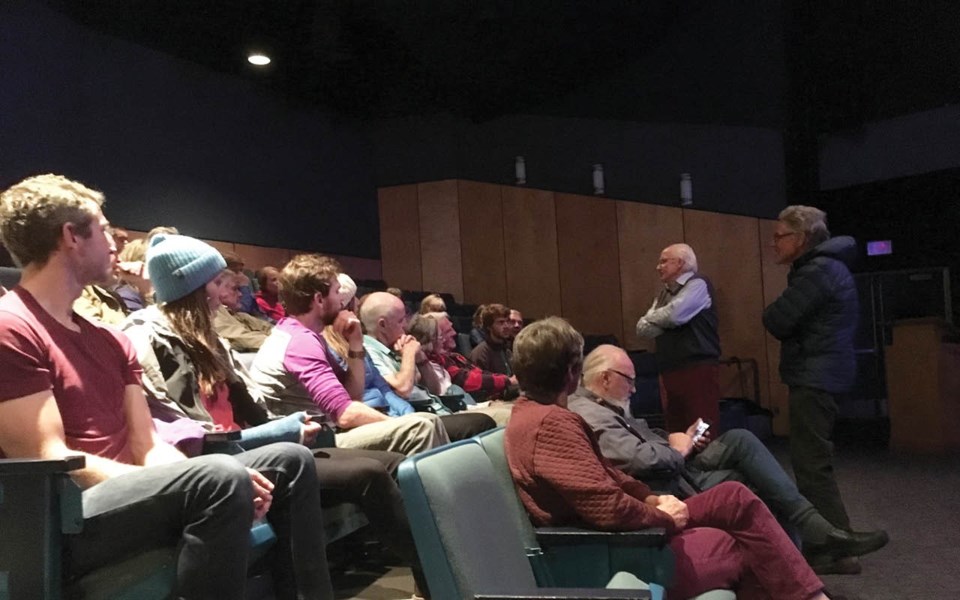Getting up the roughly 7,300-metre (24,000-foot) Karakoram Ogre in Pakistan was challenging enough.
But for British mountaineer Doug Scott, the descent was even more treacherous as he broke both his legs at the ankle shortly into his return journey.
During a presentation at Squamish's Eagle Eye Theatre on Oct. 21, Scott shared his memories of that 1977 trip and many decades of climbing, with surprising humour and breeziness considering the literal life-or-death situations he and his companions faced on their expeditions.
Scott described how he and Chris Bonington forged ahead while other members of their team, Clive Rowland and Mo Anthoine, stayed behind planning to join them later. Scott and Bonington were nearing the summit and decided to push on even late in the afternoon.
"We only had one night's food left, so it was now or never," Scott said during his presentation.
Scott said he reached the top first as the sun was setting. By the time Bonington arrived it was starting to get dark. As they began rappelling down the mountain in the dark to meet their friends back at camp, Scott admittedly was in a rush to return. That's when he lost his footing and swung in the dark toward a rock face, getting his feet up just in time to brace for the impact.
"I pushed my left foot against the rock and I realized that wasn't right. There was a sharp pain right up into my groin. I pushed with the other leg and that definitely wasn't right," Scott said. "All the bones around the ankle were crackling."
He managed to gingerly descend down to camp with Bonington to meet the others, then as luck would have it a storm blew in that night keeping them pinned down for two more days.
Once it was safe to leave camp, the crew had to complete an ascent before it could properly descend the mountain. Scott slowly but surely crawled along on his hands and knees in order to get up, and on the way down, he credited Anthoine for waiting for him as he made the descent at a glacial pace.
Bonington, meanwhile, cracked his ribs and contracted pneumonia during the descent to further complicate matters.
Eventually, the team reached base camp over a week late. Without any food during that time, Scott recalled the team members gobbled down the only sustenance they found upon arrival at the deserted camp: rice that had been mixed with used teabags and cigarette ash.
At camp, they found a note saying they were presumed dead and a search party was being organized. In a panic, one climber ran ahead to try to meet the searchers to let them know the explorers were, in fact, alive.
Help arrived after five days and Scott was stretchered to the Askoli village where they were met by a helicopter to take them to Skardu. But as they approached their destination, the heli crash-landed about 60 metres way, Scott estimated. Thankfully, no one was seriously injured.
Scott soon made it home to receive care in Nottingham, where he recovered, though he added his ankles have been weak ever since.
Despite the treacherous experience, Scott said he believes it made him a better climber, reinforcing the idea that one learns more from struggles than successes.
Scott's stories were shared from his book about the experience, The Ogre: Biography of a Mountain and the Dramatic Story of the First Ascent, while also sharing the work of Community Action Nepal, the organization he founded to bring clean water and build schools and health posts in remote areas of the country. The organization has completed roughly 50 projects.
Proceeds from the talk went to the organization, while Scott also auctioned off a pair of photographs to raise more funds. Scott was set to continue his Canadian tour on Vancouver Island this week.
Introducing the mountaineer was B.C. resident Rob Wood, with whom he embarked on one of his first ascents after recovering from his injuries when they scaled Mount Waddington in the Coast Mountain Range in 1978.
No climbers attempted to summit the Ogre for 24 years after Scott and Bonington's success. Scott is also known for completing the first ascent of Mount Everest's southwest face in 1975.
For more on Community Action Nepal, visit https://www.canepal.org.uk.




